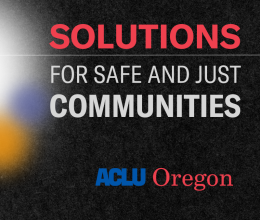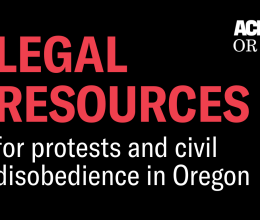
This Op-Ed was originally published in The Oregonian. You can access the original version at this link.
Sandy Chung, Joy Alise Davis and Khanh Le
Chung is executive director of the ACLU of Oregon. Davis is president and executive director of Imagine Black. Le is executive director of Unite Oregon.
We all agree that state leaders must take swift action to address drug addiction and homelessness. Their policy decisions will create a state filled with thriving communities or one filled with jails and prisons. They can’t do both.
An interest group funded by billionaires and led by a former prison system chief is pressuring lawmakers to recriminalize possession of small amounts of drugs, viewing police and jails as the way to address drug addiction. A recent Oregonian/OregonLive editorial also pushes for this approach – for adults and youth. They argue that Oregonians haven’t been sentenced to prison for possessing user amounts of drugs in many years, but ignore that jailing someone who’s been arrested is still imprisonment.
Thousands were arrested and jailed every year until Measure 110, and jails are hard, dangerous places. Over the past year, suicides and overdoses increased in Multnomah County jails. Washington County jails also had increases in deaths. What will happen if thousands more people are sent to jails because of drug addictions, when jails can’t handle the current numbers? Moreover, jails simply cycle people in and out. They don’t solve addiction or keep homeless people off the streets.
Over the past 50 years, until Measure 110 was adopted in 2020, Oregon chose jails and prisons to fight the war on drugs. What did that get us? Our incarcerated population increased more than threefold since the 1970s due to Oregon’s prison-centric approach to many offenses, and we’ve squandered billions of tax dollars on the criminal system every year. But it’s never enough. This year, state lawmakers increased funding for public defense by more than $100 million; yet too many Oregonians still cannot access a defense attorney, destabilizing the entire system.
By choosing police, jails and prisons for 50 years, did Oregon make drug addiction and homelessness better? The answer is a definitive no. Drug addiction and homelessness have been in constant crisis, long before Measure 110 and continuing today. As serious as these issues are in Oregon, many states are in worse shape. According to our calculations based on federal overdose data, 19 states had higher fatal overdose rates from June 2022 to June 2023, and none of them have a law like Measure 110.
Why do drug addiction and homelessness continue to plague Oregon? Answer: insufficient resources. Everyday Oregonians and experts agree that real solutions to these crises are addiction treatment with recovery housing; affordable housing and reducing poverty; safe and accessible shelters; work programs for trash clean-up and neighborhood revitalization efforts; and sending crisis counselors, instead of police, to respond to people having mental health or addiction crises. However, although Measure 110, local governments and state lawmakers added more resources during the past couple years, Oregon still does not provide enough to meet our state’s needs.
Why are we here? As stated in the Oregonian editorial, “Law enforcement, often asked to be the last resort for the community’s most intractable problems, cannot fix the chaos with arrests.” For decades, Oregon misused the criminal system for societal concerns that are health and poverty issues. Our state has hemorrhaged billions on a system that simply cannot solve the root causes of drug addiction and poverty — and this policy failure starved real solutions of desperately needed funding.
Not to mention, police and jails make drug addiction and homelessness more difficult and expensive to solve because the criminal system causes trauma, increases the risk of overdose deaths and creates formidable obstacles to addiction treatment, housing, education and jobs.
Moreover, the racism entrenched in the criminal system disproportionately locks up people of color, especially Black people. No one can deny that the war on drugs decimated Black and brown communities. Criminalizing addiction simply punishes our most vulnerable communities who have the least access to money and health resources. When our state barely meets 50% of treatment needs, diverting limited tax dollars away from solutions to the ineffective, exorbitantly expensive tactic of criminalization is wasteful, irresponsible and inhumane.
Oregon is what we make it. We can create thriving communities but to do so, we must reduce rates of addiction and eliminate public drug use. These serious issues cannot be addressed with the false promise of criminalization. We must address their root causes with real solutions including more treatment, housing, and crisis-response teams.
Insanity is doing the same thing over and over again and expecting different results. Oregon must stop repeating failed, racist policies that make drug addiction and homelessness more difficult and expensive to solve. The future of our state depends on it.




